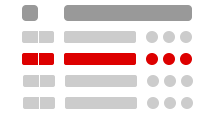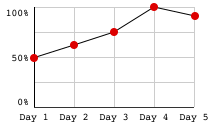Equation of a horizontal line
A horizontal line runs from left to right and lies parallel to the x-axis. It's also a linear line, much like many that you've encountered so far (e.g. slope intercept form, general form). But what makes it so special? The equation of a horizontal line is unique and you'll soon see why.
What is the slope of a horizontal line
When we deal with horizontal lines, what is its slope? You can probably answer this question without too much mathematics. Look at a perfectly horizontal line on the graph below.
A slope tells us how steep a line is. In fact, the slope can be found via rise/run, which helps us determine steepness. Looking at the red line above, how steep is it? The slope of a horizontal line is actually 0. It never rises (or falls), so if we were to find the rise/run, we'd get 0/run. 0 divided by anything is still equal to 0, and therefore, our horizontal line's slope is 0.
Backtracking a bit, what is the equation of a horizontal line? Since the line is horizontal and runs parallel to the x-axis, the equation is simply:
Example problems
Question 1:
Determine the line of equations from the following points.
i) (-5, 2), (3, 2)
Solution:
Once again, take a look at either points or the graph itself. The y axis coordinates are both 4. The line runs along y =4. Your answer will be that the equation is y=4.
iii) (b,m), (c,m)
Solution:
Even without numbers, you now understand that the y-coordinates can tell you the equation of the line. In this case, the equation = y=m.
Question 2:
Write the equation of the line with the given information:
Horizontal, passes through (4,7)
Solution:
While we aren't given two points to observe, the information given tells us all we need to know. It states that the line we're dealing with is horizontal. Therefore, we can take a look at just the y coordinate of the given point to help us determine the horizontal line's equation. You should find that the equation = y=7.
Looking on what to tackle next? Learn about parallel and perpendicular lines in linear functions, and what they should look like. You can also learn how to graph linear inequalities in two variables or graph systems of linear inequalities. There's still a lot to learn in terms of linear functions, so make sure you've got this lesson on horizontal line slope cemented before moving on!






